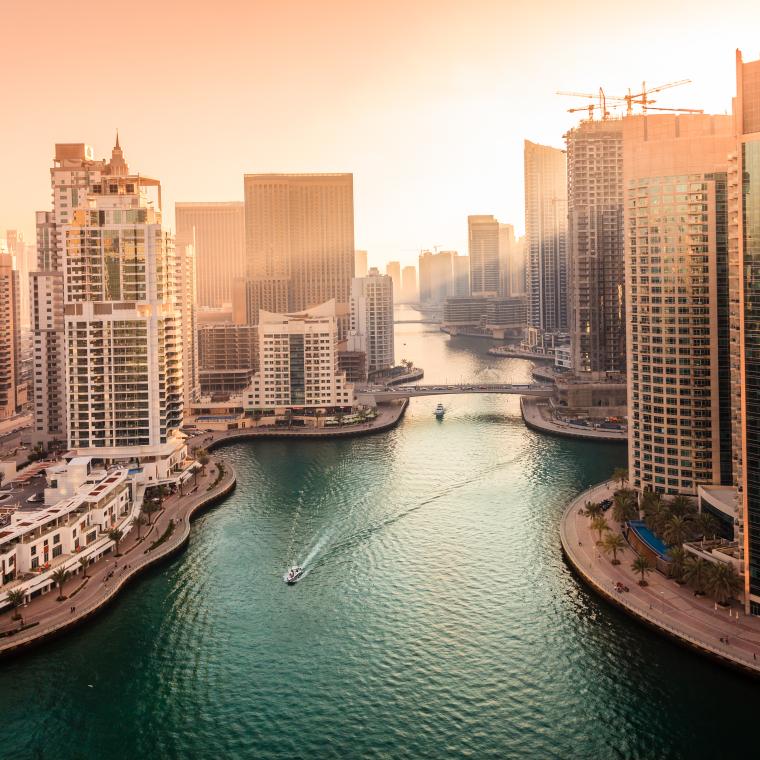
With nearly twenty years' experience in the Middle East, Lynda O'Mahoney delivers her perspective on the trends she is currently observing in the private wealth and private client industries in the region.
With clear opportunities in the Middle East, and with Ocorian strengthening its commitment to the region, I think the growth in the private wealth and private client industry in the Middle East is very exciting. Here are just some trends I am currently seeing in the region and why they matter to us.
Domestic structuring
Firstly, we are undergoing a lot of work in relation to domestic structuring for regional families who want to structure their assets locally. Whilst international structuring in offshore finance centres, such as the Channel Islands, has been developing for many years, local structuring is relatively new. This is is an exciting area of growth for us, as this is a solution we could not provide to our clients until recently.
As part of this, the DIFC, ADGM and RAK ICC foundations regime has really taken off: we have around 550 foundations already registered as of September 2022. The UAE foundations are also the only private wealth vehicles which can hold UAE real estate. They are also the only orphan structures (without shareholders) in the Middle East, allowing for the transfer of the ownership of assets from own name, which is a key tenet of asset protection, which facilitates the flow of wealth across generations and the continuity of businesses.
What I think this growth demonstrates is that families and high net worth individuals have become a lot more aware of the need for asset protection and intergenerational planning. In the Middle East we are experiencing a generational shift, with the next generation stepping up in terms of planning for financial security. Unfortunately, in some cases after the patriarch passes away, issues arise amongst siblings and as a result, the assets are diluted by legal costs and the distribution of family wealth to multiple heirs. One positive aspect is we are seeing is an increase in the awareness of the need for that structuring alongside a deepening sophistication of family governance.
Our team in the Middle East has seen a significant uptick in the use of foundations for domestic structuring. As previously mentioned, traditionally, families and ultra-high net worth individuals that hold assets outside of the region tend not to structure them domestically. If they have financial assets in Switzerland, for example, or commercial real estate in the UK, we are more likely to see those assets being structured in the Channel Islands.
Whatever the asset class, or jurisdiction of the structure, it is our responsibility to ensure the clients feel confident their assets are protected and they can sleep at night knowing they are in safe hands. That assurance is going to continue, and it is great to be able to offer those solutions at Ocorian, with our ability to cater for both international and domestic structuring.
Leevyn Isabel, Business Development Director at Ocorian, recently highlighted the development of structuring in the UAE at a presentation given at the 2022 MEA Finance Wealth & Investment Summit & awards. He emphasised that the foreign heirship under Sharia Law, applicable in the UAE and in the GCC, does not apply to non-Muslims. The image below explores the timeline of structuring in UAE from 2005 to present, from a simple English language will (for non-Muslims) to more sophisticated wealth structures like trusts and foundations. This is a great testament to how structuring has evolved in the UAE and the commitment of the UAE to be a top-tier jurisdiction for wealth management.
Impact investing and ESG
Impact investing and ESG concerns, particularly for next-gen family members, is also an area of significant growth.
It is also an area where we sometimes see a gap between generations. Next gen can have a very different approach to investing, allocation of capital - to global sustainability in general - to that of their parents or grandparents. We see the next gen looking at very different types of investments: from ESG investments to crypto assets.
An example of such a gap was one of our family clients, a family in which the patriarch had become wealthy from the manufacture of plastics. He started his operation in the Middle East in the 1980s and built a very successful business. However, when it came to the next generation getting involved, his two children were not interested in the business. After much discussion, which Ocorian facilitated, a family office was established. The father agreed to sell the business with the money being used by the children to protect the family for future generations.
The children encountered an issue when they were consulting impact investments and keeping ESG in mind: the returns were not comparable with the revenue and profits generated by the manufacturing business in the past. In their perspective, the next generation had great ideas about investing, but they were not ticking the box from a return perspective for their father, so they had to find investment opportunities that ticked both. When I spoke to the son recently, he told me his father is now obsessed with recycling and, as a family, they have completely changed their perspectives and behaviour.
We are seeing more of these success stories in the Middle East as brilliantly talented entrepreneurs - true advocates of ESG and sustainability - are changing the mindset of previous generations. We are also seeing this new generation of clients using foundations to structure their businesses and their wealth.
The complexity of family offices
Finally, another trend in the Middle East is the further development of family offices. Family offices are becoming much more diverse. Traditionally, a family office was just about investments and a vehicle for allocating capital. Now that is very different. Alongside investments we are seeing family offices used for protection of wealth, succession and intergenerational planning and governance. We are witnessing the desire to professionalise the family office, and that's where Ocorian can step in and help, if even just with administration or accountancy.
There are numerous trends coming out of the Middle East, some of which are highlighted above, which make it such an exciting time for Ocorian. We are very committed to the Middle East and will continue to grow our presence here. It is an important growth market for us.
From foundation and trust services to succession planning for family assets and businesses, Ocorian's private client team provides a one-stop shop so you can take full advantage of the opportunities in the Middle East and beyond.
Click here to learn more about Ocorian's services in the Middle East.

